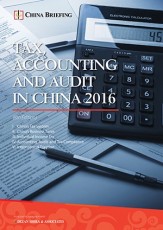Understanding China’s Tax Offenders Blacklist System
By Dezan Shira & Associates
Editor: Tongyu Zhang
On April 16, 2016, China’s State Administration of Taxation (SAT) published amended measures to what is known as the blacklist system against tax illegalities, which came into effect on June 1, 2016. The amended measures add a credit repair mechanism to the original system. The SAT describes the updated measure as a ‘one body and two wings’ structure, with ‘one body’ standing for the tax credit system and ‘two wings’ referring to the disclosure of information system, and the joint punishment and administration imposed by relevant authorities and institutions.
Under the revised measure, the following tax-related offenses will be made public:
- Tax evasion;
- Evading tax arrears;
- Filing false export declaration to obtain a tax refund for exports;
- Refusing to pay taxes by means of violence or threat;
- Falsely making out special invoices for value-added tax (VAT) or other invoices to defraud a tax refund;
- Falsely issuing plain invoices to a certain amount;
- Falsifying invoices, anti-fake articles, or supervisory seals; and
- Other serious violation circumstances, which cause significant social impact.
Information disclosure system
The name of the offender, their social credit code or taxpayer identification number, registered address, and the personal information (name, sex, ID number) of its legal representative, directly liable financial staff or the actual liable person, will be entered in the information disclosure system for the above-stated serious tax-related offense cases. Details of the case, including facts of the violation, relevant legal references, authorities conducting the inspection, related disposal and penalties information, and the specialized tax-related service agency involved, will also be filed. Such information will be disclosed through the provincial level taxation authorities’ website, and may also be made public via their online bulletin board of tax authorities of the relevant level, and through newspapers, radio, TV, internet media, and press conferences.
If a company with serious tax-related violations changes its legal representatives or the person in charge after an infraction has been posted, the taxation authorities will make the change public and disclose the information of both the new and the old representative, with an indication of who was in charge when the offense occurred.
Credit repair mechanism
A credit repair mechanism is now available that allows offenders to be removed from the blacklist and regain their integrity and reputation if certain conditions are met. If parties involved in a tax-related offense case can fully pay the taxes in arrears and pay overdue fines and other required fines, the case information will be entered only into the information disclosure system rather than being disclosed to the public. If the case information has already been disclosed, the publicity may be ceased and the information removed from the bulletin board contingent upon the decision made by taxation authorities. At the same time, the decision will be notified to the other relevant authorities that impose joint punishment and administration. The information will also be removed from the bulletin board when the period of publication exceeds two years. However, once a violation is filed, the case information will be kept permanently as part of the tax payment credit record.
![]() RELATED: Tax and Compliance Services from Dezan Shira & Associates
RELATED: Tax and Compliance Services from Dezan Shira & Associates
Penalties for tax offenses
Under the SAT, the violator’s tax payment credit level will automatically be rated as Level D, and the administrative measures for such taxpayers will be applied. Taxation authorities may then provide the information to the relevant departments participating in joint punishment and administration.
Other measures of joint punishment include:
- Prohibition from leaving China;
- Restriction from assuming certain positions in a market entity;
- Reference for credit rating for financing by financial institutions;
- Prohibition from purchasing certain commodities and services such as luxury goods;
- Disclosure of the information via the National Enterprise Credit Information Publicity System;
- Restriction from obtaining land supplied by the government;
- Prohibition from participating in governmental procurements;
- Ineligibility to management of Customs-certified companies;
- Restriction from some operations in securities and insurance market;
- Prohibition from the transfer of rights and interests of toll roads;
- Restriction of governmental funds support;
- Restriction from issuing cooperate bonds;
- Restriction from applying for import quotas of agricultural products; and
- Publishing information through major news websites.
The range and content of the joint punishment for taxation blacklist may be extended to measures beyond this list. Taxation authorities tend to extend restrictions to real estate, travelling, starred-hotels, and other high consumption sectors. Some related professional associations will also be involved in the joint action, such as the Chinese Institution of Certified Public Accountants and the China Certified Tax Agents Association, as well as the State Administration of Foreign Exchange.
Takeaways
The taxation blacklist system can be seen as part of the establishment of a Social Credit System, which has been proposed by the State Council. One major target of the framework is to enhance the establishment and application of online sharing systems in order to promote a credit-information sharing platform across regions, sectors, and departments. In a recently released guideline for social credit system promotion, the State Council emphasized that public resources, services, and business opportunities will be first offered to market entities with good credit. These measures indicate the government’s determination for an effective credit mechanism in which taxation credit plays a critical role.
Foreign companies and investors, whatever their business model, should be aware of these regulatory trends and respond accordingly. With an increasing cost for taxation violations, more attention should be paid to internal management and controls to prevent potential risks. As the taxation credit system is in a gradually evolving process, foreign taxpayers should make efforts to improve communication with local taxation authorities. Also, in the context of China’s broader taxation system reform, foreign taxpayers should keep up to date with the latest regulation changes in order to ensure compliance.
|
Asia Briefing Ltd. is a subsidiary of Dezan Shira & Associates. Dezan Shira is a specialist foreign direct investment practice, providing corporate establishment, business advisory, tax advisory and compliance, accounting, payroll, due diligence and financial review services to multinationals investing in China, Hong Kong, India, Vietnam, Singapore and the rest of ASEAN. For further information, please email china@dezshira.com or visit www.dezshira.com. Stay up to date with the latest business and investment trends in Asia by subscribing to our complimentary update service featuring news, commentary and regulatory insight.
|

 Tax, Accounting, and Audit in China 2016
Tax, Accounting, and Audit in China 2016
This edition of Tax, Accounting, and Audit in China, updated for 2016, offers a comprehensive overview of the major taxes that foreign investors are likely to encounter when establishing or operating a business in China, as well as other tax-relevant obligations. This concise, detailed, yet pragmatic guide is ideal for CFOs, compliance officers and heads of accounting who must navigate the complex tax and accounting landscape in China in order to effectively manage and strategically plan their China-based operations.
 An Introduction to Doing Business in China 2016
An Introduction to Doing Business in China 2016
Doing Business in China 2016 is designed to introduce the fundamentals of investing in China. Compiled by the professionals at Dezan Shira & Associates in June 2016, this comprehensive guide is ideal not only for businesses looking to enter the Chinese market, but also for companies who already have a presence here and want to keep up-to-date with the most recent and relevant policy changes
 Establishing & Operating a Business in China 2016
Establishing & Operating a Business in China 2016
Establishing & Operating a Business in China 2016, produced in collaboration with the experts at Dezan Shira & Associates, explores the establishment procedures and related considerations of the Representative Office (RO), and two types of Limited Liability Companies: the Wholly Foreign-owned Enterprise (WFOE) and the Sino-foreign Joint Venture (JV). The guide also includes issues specific to Hong Kong and Singapore holding companies, and details how foreign investors can close a foreign-invested enterprise smoothly in China.
- Previous Article A Complete Guide to 2016 Minimum Wage Levels Across China
- Next Article Taxes et Droits sur les Importations et Exportations en Chine









